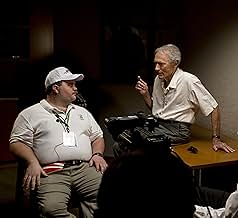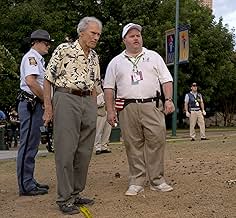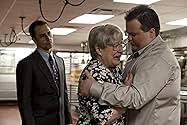Richard Jewell salva a miles de personas de una bomba en las Olimpiadas de 1996, pero la prensa lo presenta como un hombre perverso y lo acusa de ser el terrorista.Richard Jewell salva a miles de personas de una bomba en las Olimpiadas de 1996, pero la prensa lo presenta como un hombre perverso y lo acusa de ser el terrorista.Richard Jewell salva a miles de personas de una bomba en las Olimpiadas de 1996, pero la prensa lo presenta como un hombre perverso y lo acusa de ser el terrorista.
- Nominado para 1 premio Óscar
- 6 premios y 20 nominaciones en total
Argumento
¿Sabías que...?
- CuriosidadesIn real life, reporter Kathy Scruggs struggled with depression and addiction. She died of an overdose in 2001.
- PifiasBefore the bomb goes off, during the Macarena dance, one of the dancers performing on the stage is wearing an Apple Watch.
- Citas
Nadya Light: Where I come from, when the government says someone's guilty, it's how you know they're innocent.
- ConexionesFeatured in Chris Stuckmann Movie Reviews: Richard Jewell (2019)
- Banda sonoraThe Gambler
Written by Don Schlitz
Performed by Kenny Rogers
Courtesy of Capitol Records Nashville
Under license from Universal Music Enterprises
Reseña destacada
Greetings again from the darkness. Imagine you are being falsely accused of a terrorist act that killed and injured people. You are the FBI's primary suspect. Your name and face are spread across every possible media outlet. Your belongings have been searched and seized as evidence - right down to your mom's Tupperware. Cameras follow your every step of every day. Now imagine all of this occurs mere days after your actions actually saved lives and you were hailed as a hero across all of those same media outlets. Richard Jewell didn't have to imagine this, as he lived this nightmare in 1996.
We first see Richard (played by Paul Walter Hauser in one of the year's best performances) as a supply clerk at a law firm in 1986. His awkward ways and surprising efficiency catches the eye of attorney Watson Bryant (Oscar winner Sam Rockwell), a quasi-connection that comes into play a decade later. We then jump ahead those 10 years to find Richard being fired from his campus security job at a college due to his over-zealous focus on protocol. Fortunately for Richard, the Olympics are coming to Atlanta, so finding work as a security guard is pretty easy.
Atlanta's Centennial Olympic Park is shown with crowds of people cheering at a Kenny Rogers and later dancing the Macarena. As one of the on-site security guards, Richard spots a suspicious backpack that turns out to be holding the bomb that detonates, creating tragedy for many. As the viewing audience, we know that Richard's actions saved lives and he most definitely was not responsible for planting the bomb. And it's that knowing that places us as close as possible to the Richard Jewell experience.
Four-time Oscar winner Clint Eastwood directs yet another story of a working-class hero. Only this time, he blatantly calls out what he sees as two evil forces: the U.S. Government (the FBI) and the media. Billy Ray (CAPTAIN PHILLIPS, SHATTERED GLASS) based his script on the 1997 Vanity Fair article "American Nightmare: The Ballad of Richard Jewell" by Marie Brenner (who also wrote the article that was the source for THE INSIDER, 1999). It can be argued that Eastwood comes down hard on the FBI and the media, but you might consider putting yourself in Richard Jewell's shoes before crying foul.
Jon Hamm has perfected the role of cocksure FBI agent and here he plays Tom Shaw as the man totally focused on proving Richard Jewell was the perpetrator. Much has been made of Eastwood's depiction of Atlanta Journal-Constitution reporter Kathy Scruggs (played by Olivia Wilde, who directed this year's surprise hit BOOKSMART). It's a bit curious that the uproar is over what some interpret as a reporter trading intimate relations for a scoop, yet Eastwood's contempt seems focused more on the idea of trying a citizen's case in public ... while lacking any real evidence outside of a profile. The reporter (Ms. Scruggs passed away in 2001) is certainly portrayed as an ultra-aggressive reporter desperate for a headline story, but the implied consensual affair occurred after the inside information was provided - and the FBI agent was actually surprised... "Is this really going to happen?" Perhaps the viewer reaction to this is a sign of the times, but I'm guessing if any one of Eastwood's critics were similarly falsely accused (as Jewell), the fictionalized version of the reporter would be less important than having the truth discovered. Of course, this could have been easily avoided had the name of the reporter been changed for the film.
Two key supporting roles come courtesy of Oscar winner Kathy Bates as Richard's mother Bobi, and Nina Arianda as Watson Bryant's paralegal. Ms. Bates starts out as a loving and simple mother to Richard, but her press conference captures the character in a new light. It's a strong and heartfelt performance. Ms. Arianda brings some warmth sprinkled with welcome sarcasm to her role. Mr. Hauser is spot-on in every scene, and when these four are all together, it's a pleasure to watch. Hauser and Rockwell are especially good in their scenes together as the 'wronged man' contrasted with the take-no-guff attorney.
Every time Richard says "I'm law enforcement too", it's heart-breaking to us and an opening for the FBI to manipulate him. The profile of a single white male living at home with his mom, carrying gung-ho dreams of a career in law enforcement, while collecting guns and knowledge on bombs and police procedure, made Richard Jewell seem like the kind of guy who would do something for attention. However, the film and the true story both emphasize the danger of prematurely persecuting individuals - especially in public. These days the race is always about who is first with a story, rather than who is right. A rush to judgment can be seen as an abuse of power, whether it's by the media, a law enforcement agency, or folks on social media. At this stage of his career, director Eastwood seems more interested in telling stories than showing one. He offers up little visual artistry outside of the terrific performances, but this story ... it's a doozy.
We first see Richard (played by Paul Walter Hauser in one of the year's best performances) as a supply clerk at a law firm in 1986. His awkward ways and surprising efficiency catches the eye of attorney Watson Bryant (Oscar winner Sam Rockwell), a quasi-connection that comes into play a decade later. We then jump ahead those 10 years to find Richard being fired from his campus security job at a college due to his over-zealous focus on protocol. Fortunately for Richard, the Olympics are coming to Atlanta, so finding work as a security guard is pretty easy.
Atlanta's Centennial Olympic Park is shown with crowds of people cheering at a Kenny Rogers and later dancing the Macarena. As one of the on-site security guards, Richard spots a suspicious backpack that turns out to be holding the bomb that detonates, creating tragedy for many. As the viewing audience, we know that Richard's actions saved lives and he most definitely was not responsible for planting the bomb. And it's that knowing that places us as close as possible to the Richard Jewell experience.
Four-time Oscar winner Clint Eastwood directs yet another story of a working-class hero. Only this time, he blatantly calls out what he sees as two evil forces: the U.S. Government (the FBI) and the media. Billy Ray (CAPTAIN PHILLIPS, SHATTERED GLASS) based his script on the 1997 Vanity Fair article "American Nightmare: The Ballad of Richard Jewell" by Marie Brenner (who also wrote the article that was the source for THE INSIDER, 1999). It can be argued that Eastwood comes down hard on the FBI and the media, but you might consider putting yourself in Richard Jewell's shoes before crying foul.
Jon Hamm has perfected the role of cocksure FBI agent and here he plays Tom Shaw as the man totally focused on proving Richard Jewell was the perpetrator. Much has been made of Eastwood's depiction of Atlanta Journal-Constitution reporter Kathy Scruggs (played by Olivia Wilde, who directed this year's surprise hit BOOKSMART). It's a bit curious that the uproar is over what some interpret as a reporter trading intimate relations for a scoop, yet Eastwood's contempt seems focused more on the idea of trying a citizen's case in public ... while lacking any real evidence outside of a profile. The reporter (Ms. Scruggs passed away in 2001) is certainly portrayed as an ultra-aggressive reporter desperate for a headline story, but the implied consensual affair occurred after the inside information was provided - and the FBI agent was actually surprised... "Is this really going to happen?" Perhaps the viewer reaction to this is a sign of the times, but I'm guessing if any one of Eastwood's critics were similarly falsely accused (as Jewell), the fictionalized version of the reporter would be less important than having the truth discovered. Of course, this could have been easily avoided had the name of the reporter been changed for the film.
Two key supporting roles come courtesy of Oscar winner Kathy Bates as Richard's mother Bobi, and Nina Arianda as Watson Bryant's paralegal. Ms. Bates starts out as a loving and simple mother to Richard, but her press conference captures the character in a new light. It's a strong and heartfelt performance. Ms. Arianda brings some warmth sprinkled with welcome sarcasm to her role. Mr. Hauser is spot-on in every scene, and when these four are all together, it's a pleasure to watch. Hauser and Rockwell are especially good in their scenes together as the 'wronged man' contrasted with the take-no-guff attorney.
Every time Richard says "I'm law enforcement too", it's heart-breaking to us and an opening for the FBI to manipulate him. The profile of a single white male living at home with his mom, carrying gung-ho dreams of a career in law enforcement, while collecting guns and knowledge on bombs and police procedure, made Richard Jewell seem like the kind of guy who would do something for attention. However, the film and the true story both emphasize the danger of prematurely persecuting individuals - especially in public. These days the race is always about who is first with a story, rather than who is right. A rush to judgment can be seen as an abuse of power, whether it's by the media, a law enforcement agency, or folks on social media. At this stage of his career, director Eastwood seems more interested in telling stories than showing one. He offers up little visual artistry outside of the terrific performances, but this story ... it's a doozy.
- ferguson-6
- 11 dic 2019
- Enlace permanente
Selecciones populares
Inicia sesión para calificar y añadir a tu lista para recibir recomendaciones personalizadas
Detalles
- Fecha de lanzamiento
- País de origen
- Sitio oficial
- Idioma
- Títulos en diferentes países
- El caso de Richard Jewell
- Localizaciones del rodaje
- Centennial Olympic Park, Atlanta, Georgia(on location)
- Empresas productoras
- Ver más compañías en los créditos en IMDbPro
Taquilla
- Presupuesto
- 45.000.000 US$ (estimación)
- Recaudación en Estados Unidos y Canadá
- 22.345.542 US$
- Fin de semana de estreno en EE. UU. y Canadá
- 4.705.265 US$
- 15 dic 2019
- Recaudación en todo el mundo
- 44.645.542 US$
- Duración2 horas 11 minutos
- Color
- Mezcla de sonido
- Relación de aspecto
- 2.39 : 1
Contribuir a esta página
Sugerir un cambio o añadir el contenido que falta









































